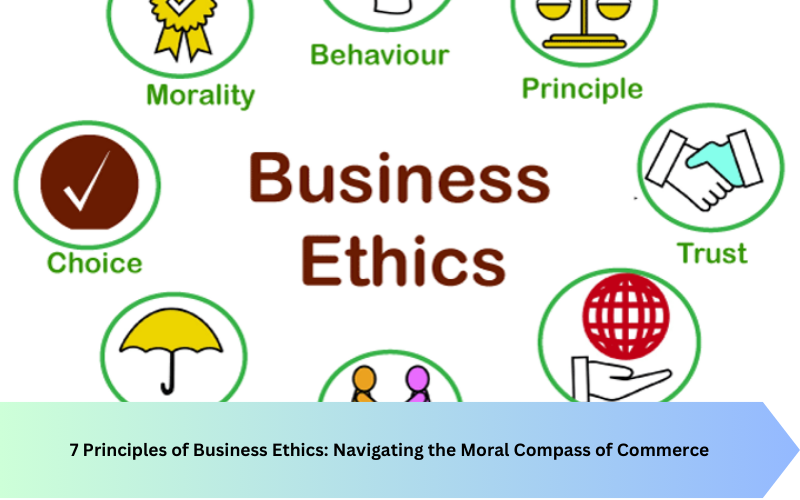In the dynamic landscape of modern commerce,7 Principles of Business Ethics play a pivotal role in shaping the reputation and longevity of a business. Upholding ethical standards isn’t just a moral obligation; it’s a strategic imperative that fosters trust among stakeholders, promotes sustainability, and ensures long-term success.
1. Integrity: The Foundation of Trust
Integrity forms the bedrock of ethical business conduct. It entails honesty, transparency, and consistency in actions and communications. Upholding integrity means adhering to moral and professional principles, even when faced with difficult decisions or tempting shortcuts. Businesses built on integrity earn the trust of customers, employees, and investors, fostering enduring relationships and sustainable growth.
2. Respect for Stakeholders: Balancing Interests Ethically
A business doesn’t operate in a vacuum; it exists within a web of interconnected relationships with various stakeholders, including employees, customers, suppliers, communities, and shareholders. Ethical conduct demands recognizing and respecting the rights, interests, and dignity of all stakeholders. By prioritizing fair treatment and fostering inclusive practices, businesses can create a positive impact beyond financial returns.
3. Fairness: Promoting Equity and Justice
Fairness lies at the heart of ethical decision-making. It involves treating all individuals and groups impartially, without discrimination or bias. Fair business practices encompass equitable distribution of opportunities, resources, and rewards, ensuring that everyone has a level playing field to thrive. Embracing fairness fosters a culture of inclusivity and fosters a sense of belonging among diverse stakeholders.
4. Responsibility: Embracing Accountability for Actions
With power comes responsibility. Ethical businesses acknowledge their duty to society and the environment, beyond maximizing profits. Corporate responsibility entails minimizing negative impacts on the environment, promoting social welfare, and complying with laws and regulations. By proactively addressing societal concerns and environmental challenges, businesses can contribute to a more sustainable and equitable world.
5. Compliance: Upholding Legal and Ethical Standards
Operating within the bounds of the law is non-negotiable for ethical businesses. Compliance with legal regulations and industry standards ensures that businesses operate ethically and responsibly. Moreover, ethical conduct often surpasses mere compliance, requiring businesses to uphold higher moral standards and principles, even in the absence of specific legal mandates.
6. Accountability: Transparency and Oversight
Accountability is the linchpin of ethical governance. Transparent reporting and disclosure practices enable stakeholders to hold businesses accountable for their actions. Establishing robust oversight mechanisms, such as independent audits and ethical committees, fosters accountability at all levels of the organization. By embracing accountability, businesses demonstrate their commitment to ethical conduct and earn the trust of stakeholders.
7. Sustainability: Balancing Profit with Planet and People
Sustainability embodies the ethos of responsible stewardship, balancing economic prosperity with environmental conservation and social well-being. Ethical businesses integrate sustainability into their core strategies, aiming for long-term viability without compromising the needs of future generations. By adopting sustainable practices, such as renewable energy adoption, waste reduction, and fair labor practices, businesses can mitigate risks, enhance brand reputation, and create shared value for society.
Frequently Asked Questions (FAQs)
1. Why are business ethics important?
Business ethics are essential for fostering trust, maintaining reputation, and ensuring long-term success. Ethical conduct enhances relationships with stakeholders, reduces legal and reputational risks, and contributes to sustainable growth.
2. How can businesses promote ethical behavior among employees?
Businesses can promote ethical behavior among employees by establishing clear ethical guidelines, providing training and education on ethical decision-making, fostering a culture of openness and accountability, and recognizing and rewarding ethical conduct.
3. What are the consequences of unethical business practices?
Unethical business practices can lead to damaged reputation, loss of trust among stakeholders, legal consequences such as fines and lawsuits, employee dissatisfaction and turnover, diminished brand value, and long-term financial repercussions.
4. Can a focus on ethics compromise profitability?
While there may be short-term costs associated with ethical practices, such as investments in sustainability or compliance efforts, prioritizing ethics typically leads to long-term profitability. Ethical businesses tend to attract loyal customers, retain talented employees, mitigate risks, and build resilient brands, ultimately enhancing profitability over time.
5. How can businesses ensure 7 Principles of Business Ethics ethical supply chain practices?
Businesses can ensure 7 Principles of Business Ethics ethical supply chain practices by conducting due diligence on suppliers, establishing codes of conduct for suppliers, conducting regular audits and assessments, providing training on ethical sourcing, and fostering collaborative relationships with suppliers committed to ethical standards.





